"I wanted to look at New York in a slightly different way - I wanted to look at it in a soulful, bluesy way. There's a side of New York that's very caring, soulful, and loving, and I wanted to capture that part of it. It's like snapshots I took, but I put them in the form of music." ~ Steve Hunter on The Manhattan Blues Project
Steve Hunter has played some of the greatest riffs in rock history - that first slamming solo that rings in Aerosmith's Train Kept A Rollin', the acoustic intro on Peter Gabriel's Solsbury Hill, and he wrote the legendary intro interlude that made Lou Reed's live version of Sweet Jane a first gold record (the Rock 'N' Roll Animal live set). If you don't recognize the name, that's OK. It's part of what goes along with being a sideman in the business of rock 'n' roll.
Steve has just released a new solo album, The Manhattan Blues Project, which sees the guitarist writing and playing melodic tone poems to his personal view of The Big Apple. He's joined on the disc by such luminaries as Joe Satriani, Joe Perry, Jason Becker, Johnny Depp, Tony Levin, Michael Lee Firkins, and 2Cellos, but make no mistake - the album is clearly Steve Hunters. The cameos work in every case, but it's Hunter on whom the light shines.
I make no qualms about the fact that I've been a huge fan of Steve Hunter since the mid-70s, and accordingly, I saw it as a great pleasure to have the chance to ask him some questions that have been on my mind for over 30 years, and it turns out that he's not just a great musician, he's also a very wise and nice man.
I decided to take the story on starting with Steve's first real break, an opportunity to move to Detroit and play with Mitch Ryder way back in 1971:
Steve Hunter: "That's a fairly easy story, believe it or not!
"I had a friend in Decatur, Illinois names John Sauder, he's a great bass player - I got a call from him one day saying that he had moved up to Detroit, and was playing bass with Mitch Ryder, who had a new band called Detroit. They were auditioning guitar players, and he wanted to know if I would like to come up and audition, so I said, 'Sure, let's do it!'
"I threw a guitar into the car, and I drove up to Detroit. It was really wonderful, because it was the first time I saw a Marshall half stack in person. I had only seen them with Jimi Hendrix, or Clapton - I'd only seen pictures, I had never actually seen one, and here I was going to get to plug into one and play!
"So, I almost didn't even think about the audition, I just wanted to play through that Marshall!
"As it turned out, it it wasn't really like an audition, we were just feeling each other out. we played some Cream tunes, and stuff like that, we had a great time. I didn't know any of their songs, so we just played songs that we all knew, and I ended up getting the gig. Through that was how I ended up meeting Bob Ezrin."
The importance of meeting Bob Ezrin cannot be overstated when discussing Steve Hunter's career - they have been working together for over three decades, and their collaborations have borne great fruit. Ezrin had produced the album Detroit, a cult classic which featured a cover of Lou Reed's Rock 'n' Roll that Reed dug so much that he instructed Ezrin to draft the guitarist for his next album:
Steve Hunter: "I've heard stories similar to that, that Lou tracked us down.
"He found Bob first, and through Bob he found me, and he wanted us to work with him on his next album. That turned out to be the Berlin album - that was my second album!
"Bob had produced the Detroit album. He had been working with Jack Richardson, who by then was a very well known producer. He had done The Guess Who's records and had a huge success with them, and Jack had taken Bob under his wing. They had worked together on a lot of different projects, and Bob was already showing signs of being a great producer.
"He ended up get involved with Mitch Ryder, and when I got up there, they gave me the gig and said, 'Oh, by the way, we're going to do a record and they have this producer named Bob Ezrin, he's going to be here next week'
"That's how that all came about, and Bob and I just sort of hit it off. I liked his producing, he liked my playing, we got along great, and that's how it all developed."
Although Steve didn't know it at the time, when Bob Ezrin assembled Lou Reed's backing band for his Rock 'n' Roll Animal Tour, he brought along guitarist Dick Wagner, who the producer had met while working with Ursa Major, another Detroit rock band of legend. In rock and roll circles, Hunter and Wagner are as well known a legend as Lewis and Clark. As Alice Cooper would later say, 'I wanted to put together the two best American guitar players that I could: Hunter and Wagner."
I asked Steve about the partnering:
Steve Hunter: "Well, I'm not quite sure how that happened to be honest!
"Bob had known Dick from Ursa Major, but you'd have to ask Dick - I don't know exactly, but Bob put together that touring band with guys we knew, like the Canadian guys, Whitey Glan (drummer) and Prakash John (bassist). I'm not sure how Ray Colcord (keys) got into the picture, I believe Dick knew him.
"Remember, there's a lot of this stuff that I wasn't aware of until I got there - there's a band, and I'm one of the guitar players. So, I really didn't know a lot of what had gone on, and how each person knew each other."
Regardless of how the pieces were fit together, fit together they did - the Rock 'n' Roll Animal band became one of the most sophisticated rock bands on the planet. Hunter and Wagner sounded like a two headed guitar monster - each came from a different side of the street, but when they met in the middle it was guitaristic bliss. One would pick up from the other and they tossed fabulous leads around as if they had been born to do so. Not as regimented as many dual guitar teams, they had an almost jazz like approach - no two nights ever sounded the same. They were flying without a net, and they took Reed along for the ride. I wondered if that had been Lou's intention:
Steve Hunter: "I think it must have been, and again, I'm not sure. That's a tough question, because Lou was looking for more of a rock band thing.
"He was going to not play guitar, and he wanted to be a frontman, he wanted to try that out.
"The wonderful thing about Lou is that he's really open to trying new stuff. He'll do one tour as a rock band, a tour as a funk band - he likes to keep mixing it up, and that keeps everything fresh for him. He has one of those creative minds where he can get bored real easy, and he doesn't want to get bored, so he keeps trying new stuff all the time, which I really admire - I really like that.
"I think this was a stage of his career where he wanted to rock it up a little, and I think that through Bob, that band was put together, and it was going to be a rock band. That's how that came about."
After touring the world with Reed, Hunter and Wagner then became the guitar players for Alice Cooper's solo band, which resulted in the Welcome To My Nightmare album, tour and eventual DVD, and their legend continued to grow. I asked about the musical relationship between the two guitarists:
Steve Hunter: "That's an interesting question, too!
"I don't remember us doing a whole lot of conscious effort to figure out who's playing what - it just sort of happened. I'd played with other guitar players before - in those days in the seventies there were lots of bands that had two guitar players. It was just - the sound was wonderful!
"The Allman Brothers, Eagles, all those bands liked the idea of two guitars. Just for orchestration and the sound it was a cool thing to have.
"With Dick, it was kind of weird because I think we were kind of opposite in a way, which made it easy for us to play together because we would think differently, you know what I mean? The only thing I remember us consciously sitting down and going through the set list and making sure we had an equal amount of solos.
"That's because we had respect for one another - we both had the same number of solos. We went through all the songs in the set, and, 'Well, Dick, maybe you should play the solo here.' So, when it came to the parts 9 times out of 10 we didn't have to really think about it - if I played down low, he'd just naturally play up high, and vice versa. It was one of those things we didn't have to work on too much - occasionally, but not much."
In fact, a listen to any of their live material (two live albums with Reed, another with Cooper) reveals that the band was truly riffing - there was certainly structure, but what got played within those structures would greatly vary from night to night, and while it usually sounded very melodic and well thought out, it also smacked of improvisation:
Steve Hunter: "Yeah, most of it was improvised. That's what he and I both loved to do - I love improvisation, I still do. That's all a holdover from me being a blues guitar player, because blues is almost all improv, even when it comes to the rhythm parts, unless it's something like Born Under A Bad Sign, where there's a riff or something.
"I've always love improvisation, and Dick has, too. We kept that a part of it when we got together. Although, that being said, it was structured, too. Like the intro to Sweet Jane was structured - when I wrote that, it was written to be a structured piece of music, but we all improvised our parts over those changes. Some nights were great, and some weren't so great - but, that's the beauty of improv!
"When the whole band is improvising, you're bound to have some nights when it may not gel as well, but that's the joy! It's one of those things where you don't know what is going to happen - that's what is so cool about jazz. Jazz guys, they love being on that edge, not knowing for sure how it's going to come out. But, there is a risk that some nights will be better than others."
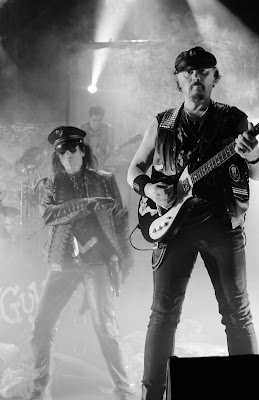 |
| Photo by Cari Paige |
After his stint with Lou Reed, Hunter received a call from another icon, ex-Cream bassist/vocalist Jack Bruce - I asked Steve how this opportunity had popped up:
Steve Hunter : "I met Jack on the Berlin album!
"I walked into the studio one day, and you have to keep in mind that this is only the second album I had worked on, and here I am in London, England. I'd never been there before in my life, and of course, I had always wanted to go there, because I'm a huge Beatles fan, I loved The Rolling Stones and Led Zeppelin, they were some of my favorite bands.
"So, here I am at Morgan Studios, a world famous studio, Yes is recording across the street, it's all just amazing!
"I walk in the studio, and there on the drums is Aynsley Dunbar who I had already met - and I realized that he was one of the most phenomenal drummers, and sitting at the B-3 is Steve Winwood, and sitting on the bass is Jack Bruce! I thought I had died and gone to heaven!
"Jack and I got along really well, I loved playing with him, and I got a call about a year later from his management wanting to know if I'd be interested in working with him on a solo album, and I said, 'Absolutely!'
"He's great to work with, he's a very cool guy - we liked playing Scrabble! We played Scrabble together quite a bit. It was a lot of fun, but it wasn't fair because he's such a wordsmith, and he had his lyricist, Pete Brown with him - so they were always creaming me!
"But boy, some great music came out of that guy, he's an incredible musician."
Moving on through Steve's career, my next stop was on Peter Gabriel's Solsbury Hill - it's a guitar part you've probably heard a hundred times, or more, but who played it was a bit of a mystery for the casual listener. I asked Steve to tell the tale of how the tune went from piano written demo to fingerpicked guitar classic:
Steve Hunter: "Well, we had pretty much finished the Gabriel album (the singer's solo debut after leaving Genesis), and for some reason or other, that song - we weren't sure whether that was going to be on the record, or not.
"I think maybe Peter had an issue with the lyrics, or something. I hadn't really heard why we were hesitant to record that for the album. It was really none of my business, I'm the guitar player, I don't really have to know that.
"Having said that, one evening I went into the studio, and Robert Fripp had already gone back to England because he had sessions waiting for him there, and the New York guys were going to leave the next day, so if we're going to cut this song, we have to do it tonight!
"Peter had worked out the lyric problem, so he was happy, everybody was happy. So, Peter and Bob took me into Bob's office in the studio, and we sort of worked out this part together. Bob had already had the idea that it should be a kind of Travis picking style, and the three of us worked out the part. We went back into the studio and recorded it that night.
"It's one of my favorite Peter Gabriel tunes ever - it's a most extraordinary song. Like I said, we all worked it out. It really made me feel great that the guitar was really a focus of the song because Peter had written it on piano!
"It was really great how it translated to guitar - we weren't sure how we were going to do that, it was all kind of nebulous at the time, until we actually sat down and started working on it and it came together.
"That's one of the beautiful things about working on music - especially, in the studio. That's one of the things I live for, when you listen to something - it's in 7/4, and at the time I wasn't really used to playing in odd times, and I have to work out a Travis picking part in 7?
"I'm going to be sitting there counting the whole time! But, with something like that, when you first sit down and think - 'Oh my God, what am I going to do?' You're sort of panicked, internally panicked, and then all of a sudden it comes together. I live for those moments. Those moments even happened on my new album - it's one of the reasons I'm still a musician, and I love it so much."
Peter Gabriel, Lou Reed, Alice Cooper - Obviously Steve Hunter is a great guitar player, but I wondered what else went into his receiving such prestigious opportunities, aside from a great set of hands:
Steve Hunter: "Well, that's a great question, Tony, and not many people ask that.
"I used to get asked that question a lot when I taught at The Musician's Institute in Los Angeles. I taught there for several years, and my students - you've got kids in there who are 19-20 years old, and just champing at the bit to get onstage and become a famous guitar player.
"My job was to help them along with that, and the problem with most any school is that the focus is way too much on the technical side of putting your fingers on the fretboard. One of the things that is missing sometimes that I tried to bring up a lot in clinics and seminars is that there is a very important element if you're going to become a musician, especially a sideman, or session player - and it's something that I learned from other musicians I've worked with. It's called musicianship.
"You have to be able to work with people. You can be the greatest guitar player in the world, but if you're a real snobby, or arrogant guy, you're not going to get as much work as the guy who may not play as well as you, but gets along with everybody, and is very cooperative and very into it - very up. It's a very fine line, because people can confuse arrogance with confidence. You have to come in and be confident, but you can't be arrogant.
"There's a lot of things about musicianship that must be learned. It doesn't just come along with the territory, you have to learn them. It's one of those things you just have to figure out. 'If I'm going to do this, I have to be cooperative and learn how to work with people you may not even like!'
"You can't say - 'I can't do that, or no, I don't want to do that.' There's a whole big area of musicianship that needs to be learned and talked about. I learned it from a very young age - my father got me guitar lessons, I started out on lap steel, and we played in these little groups and classes, and you just had to learn to get along with everybody. I learned that at 8-9 years old. And when people want you to come up with stuff, you have to be able to come up with stuff.
"There a big area of learning that is not getting covered as well - yeah, OK, if you want to be a great guitar player you have to practice eight hours a day. Well, there's more to it than just that, especially if you're going to be a sideman. You really have to learn these kinds of things. It's a whole social structure unto itself."
Fast forward to 2006, and Steve receives a call informing him that he's needed again by Lou Reed, to complete a job they had envisioned thirty-five years earlier - taking the Berlin album on the road:
Steve Hunter: "Oh man, I've got to tell you, that is one of the most wonderful phone calls I have ever received, because I'll tell you something.
"Way back when we did the Berlin album, we wanted to do it just that - we wanted to have a children's choir, we wanted violins and horns, we wanted to do the album from start to finish, in order, onstage.
"But the album was so depressing that it just didn't do that well when it first came out. The critics absolutely loved the album, said it was one of the most artistic, thought provoking albums they had ever heard, but it was also very depressing. So, it's not your kind of up rock 'n' roll record, and it's saying things that people weren't quite ready to hear in those days.
"That you have to be careful if you're doing drugs - they're dangerous. I don't think people wanted to hear that in the '70s, you know what I mean?
"It was all so much a part of our lifestyle, and here we have one of our icons telling us, 'You know, you have to be careful with that stuff!' Maybe they didn't want to hear that, but it was brilliant! I heard that album from start to finish, and I thought it was the most brilliant record I had ever heard.
"When I got the call, Bob Ezrin called me, and he kind of said it this way - 'Guess what? We're going to do the Berlin album from start to finish, with strings, horns, and a children's choir.'
"I almost fell out of my chair! 'Well great, it only took us thirty-five years!' I was thrilled - 'Yeah, let's do it.' It was one of the best phone calls I had gotten in a very long time."
The Berlin stage shows were a huge success, and it wasn't long before the phone rang again, and on the other end was an offer to go back on the road with none other than Alice Cooper:
Steve Hunter: "It's like my resume started all over again!
"It's the weirdest thing - I had toured Germany with Mitch Ryder for a while back in about 2005. I did a tour with him, a tour with Lou, and now I'm doing a tour with Alice - I'm just waiting for Peter Gabriel to call me!
"That was a great thing, though - I ah actually gotten to sit in with Alice and his band in Nashville. I was living there at the time, and I got up and played with them. God, it was great to play Eighteen again! I thought, 'Wow- this is cool!'
"We all got along and we loved it, so, the next thing, they asked me if I'd like to do the next tour. I said, 'Sure, let's go!'
Between touring for over a year with Alice Cooper, and jamming in London with Johnny Depp, Steve Hunter was being seen and heard with greater frequency by more people than had been the case for several decades - upon completion of the world tour, it was time to pursue a longtime dream - The Manhattan Blues Project. I asked about the genesis of this solo project:
Steve Hunter: "I have a friend who is a photographer in New York, and she had gone out one day - one of the first nice days of Spring in New York. She's a great photographer, and she went out and took some photos of Manhattan, and she posted a few on Facebook. One was a beautiful picture of Central Park - and this song started coming to me.
"The idea for a song came into my head, and I thought, 'Oh My God, I think there's a song coming here.' So, I grabbed a guitar and sort of roughed it out - and that became Sunset In Central Park. The more I thought about it, the more I thought, 'Wow, how cool would it be to write an album of songs on my take of New York City?'
"I'm a big DeBussy fan, he's one of my favorite composers of all time, and he's credited for writing these things called 'tone poems'. If you've ever heard Afternoon of a Fawn, when you listen to that piece, you actually see the imagery. You see this little elfish kind of thing hopping around in the meadow in the middle of a forest.
"It is the most extraordinary thing that he's able to do. La Mer - if you don't feel like you're out on a boat in the middle of a raging sea, then you're not listening! He was a genius at that, and I wanted to kind of do my version of that, so The Manhattan Blues Project became a series of tone poems, in a bluesy way. Gramercy Park is a really beautiful island in the middle of chaos, right in the middle of Manhattan - it's so beautiful. Of course, Harlem - Harlem has this wonderful history, so the songs just all started coming after that. It was the most wonderful thing!
"I wanted to look at New York in a slightly different way, I wanted to look at it in a more soulful, bluesy way. New York is a very soulful and bluesy city, even though its enormous and chaotic, and it's high energy and it can be a little hard. But there's a side of New York that's very caring and soulful, loving and all that - I wanted to capture that part of it to me. It's like snapshots that I took, only I put them in the form of music."
There was a time when being a sideman for Alice Cooper could get a guitar player a contract to record a solo record, but as you're probably aware, those days have gone - to fund The Manhattan Blues Project, Steve took a chance with Kickstarter, and it worked marvelously. His fans were willing to bear the brunt of the cost, and the guitarist delivered the goods in spades:
Steve Hunter: "It was the most wonderful experience! To have the knowledge that there were so many people out there who cared enough about me doing this album to donate money to help me do it was the most wonderful and humbling experience of my life!
"It made me feel like, 'That's the way music should be done!' If you want to hear something from me, we should work together. I'm saying to you, 'I'd like to do this album, would you like to help me put it out?' Then these wonderful people will say, 'Yeah, OK - I'll help you put it out!"
I asked if Steve thought things like Kickstarter and fan funding were things that could revitalize the floundering recording industry:
Steve Hunter: "Well, I don't know if it will ever get back to what it was, and that's largely because of the media - the media has changed so much. The labels are trying to figure out how to do it now.
"I think going directly to the people was the most extraordinary thing I can remember in ever doing a record. I mean, yeah - it's great to have a label throw some money at you, and they're going to promote it because they want to make money, but that doesn't always work. When you get signed to a label, they've got 20-25 acts signed, and they can't put money into everybody, so people get pushed aside - I've had that happen to me before.
"Here, although it's much more difficult, my wife Karen is working her butt off on the Internet and phone trying to line up interviews , like this one, to get get the record out to radio stations, and reviewers and such. It's a lot of hard work, but it's way more satisfying because we're controlling it.
"We have control of it, and we wouldn't have that if it weren't for Kickstarter. The people in Kickstarter became part of the label! The next album I do, I'm going to do Kickstarter again. I just think it's really the way to go.
"Putting it out there for the people, it was such a satisfying feeling. The donations just kept coming. The first donation - Bob Ezrin donated $250, and I thought that was the sweetest thing in the world! Then you get these people who would donate $20-25 - that was so awesome to me, that was just very touching. When you're setting there, watching your site, and people do that, it's extraordinary. That's like, 'Wow, how cool is that?'
"It's very satisfying, and it really makes you want to do a great job on the album!"
He did a great job, indeed - The Manhattan Blues Project is surely Grammy bound. As I stated in my review, it's one of the best albums I've heard in 2013, and it should certainly make it onto many year end top tens. In addition to being a great set of tunes, Steve made a great sounding record - I asked about how he went about achieving the great tones there are to be found on the album:
Steve Hunter: "Well, you'll be amazed to know that a lot of these sounds were achieved with plug-ins!
"Not all of them, I mixed it up, because you sort of have a general idea about the tones you want for something, and then you just spend some time trying to find that tone.You might get pretty close, but you don't know how it will sit in the track. Then, you might have to start all over again. So it's a process, as you can imagine.
"Sometimes, there were some plugins where I just plugged in, and I'd go through the various presets, and boom! There's one that sounds amazing. Then I usually tweak them a little - I usually don't end up using the stock presets, I tweak them a bit. A lot of times, all I do is take the reverb off, because they usually put on too much for me. So, I take the reverb off and put my own on later in the mix.
"I also have some nice amps that I like to mic up, and some cool pedals. I use a lot of pedal from Pigtronix - they're a great company, and a friend of mine owns it, and he makes some really great pedals. So, I mixed it up - probably, if I think about it, it was probably half amps, half plug-ins."
Speaking of plug-ins, Steve was able to plug in some of the hottest axeslingers in the world to contribute to the record - Joe Satriani, Joe Perry, Tony Levin, Marty Friedman, Jason Becker, Michael Lee Firkins, and even Hollywood's favorite heartthrob Johnny Depp. I wondered if he went into their participation with a game plan:
Steve Hunter: "Actually, yes I did.
"When I was writing Twilight In Harlem, I came up to the section of the song where I thought I wanted to put a solo in - I already knew Joe Satriani, we had done a benefit show in San Francisco for our friend Jason Becker. Joe closed the show, and he had asked me to come up and play some blues with him, and we did Goin' Down - oh, it was great, we had a great time, and he's such a sweet and kind guy.
"We kept in touch, sending e-mails back and forth, and when I started working on this solo section, I even said to Karen, 'Wouldn't it be great if I could get Joe to play a solo here, and the I'll have Steve Vai on because they have a history together' - so, I wrote the two solo sections with them both in mind, but Steve was just too busy. He's a good friend, and he was into doing it, but he was in Russia on tour, and there was just no way to get it done on time.
"Joe said, yes, and happened to have a window of 4-5 days and he sent me an e-mail one night, and said, 'Hey, I think I got the solo!' He sent it back to me, and it's the one you hear on the record - it's just extraordinary!
"Now, since I couldn't get Steve Vai, I asked Jason who he thought I should get - his first answer was Marty Friedman, and I thought, well yeah, of course! Jason gave me his e-mail address, he introduced us, and I sent Marty the track and he said, 'Yeah, I'd love to!
"About three days later he sent me the incredible track that he did. Now, I'm thinking I'm on kind of a roll, I'm thinking, 'Hey, I got these two guys, maybe I can have Tony Levin play some bass on something - let's get him in for Solsbury Hill, and Tony was totally into it, and he also played bass on Sunset In Central Park. I just had more courage!
"We had a lot of fun - I was a little hesitant about the 2Cellos on Sunset In Central Park, because I had heard that they had just signed a record deal and they were on the road with Elton John. I had played on one of their tracks, but I was thinking that their label might be a little protective and not let them play on anything else, which is the way it would have been in the old days. Karen said, 'No, I think you should ask them!' She asked Bob Ezrin, who had produced their record, and Bob said, 'I think they would be honored to play on it.' That floored me.
"So - now I'm thinking I could ask anybody, and sure enough I asked Johnny Depp, Joe Perry, and Michael Lee Firkins, who I had also met at Jason's benefit - a really nice guy, and a great slide player. He's a great friend of Jason's, so I asked him through Jason, and he put that great slide solo on 222 W 23rd.
"So - this was all wonderful. It was like, ''How did this all happen?' I tell ya, it sure made making the album a lot of fun!"
For all the marquee power of the record's guests, they never take the spotlight off of Steve Hunter for long. One reason is that Steve wisely chose to weave their signature styles around his own - he didn't make the mistake of trying to match their histrionics - he stood his stylish ground and the differences in techniques, styles, and individual voices make the record all the more attractive:
Steve Hunter: "I wanted the contrast between me and those guys because there's no denying their extraordinary skills as guitar players.
"They play their way, I play mine, and the contrasts really work. It worked like a charm! If I had gotten somebody that played like me, it would not have been the same. It wouldn't have the same impact."
Now that The Manhattan Blues Project is on the streets and getting rave reviews, I asked the guitarist what may lie ahead:
Steve Hunter: "Well, I'm thinking about the next project and I'm hoping it will be with Karen - she's got a great voice, and she's a great singer and writer. We've already done one album called, Empty Spaces, which were a bunch of songs she had written, very personal, about her and her family, and it's a beautiful record. So, we're thinking about doing maybe an EP - 5 or 6 songs, but these may be cover tunes.
"We're going to just pick out our favorites - one of the things I like doing is arrangements of other songs, it's something I've always enjoyed doing, and there may even be more covers on my next album because of that. I love interpreting other peoples songs in my own way - I find that very satisfying."
Such is the life of a consummate musician and sideman. Steve Hunter has been filling the position admirably for over forty years, and there'd be no point in stopping now, would there?


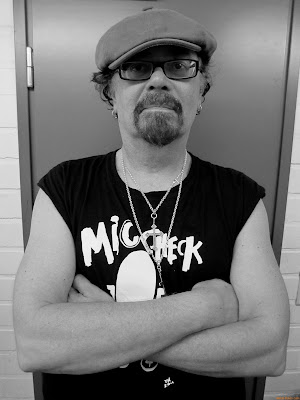

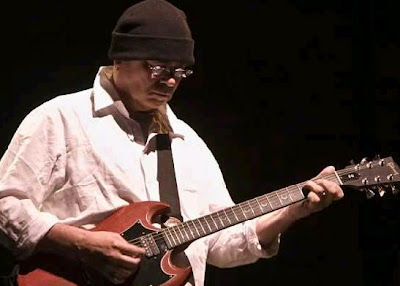







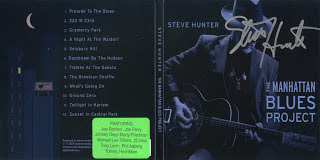
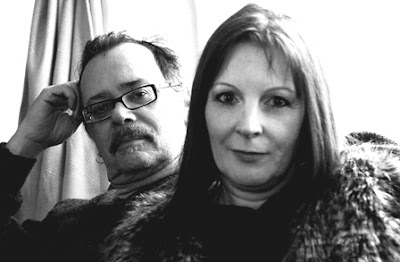
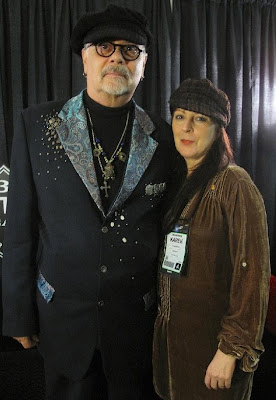



No comments:
Post a Comment